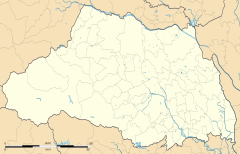Nisshin Station (日進駅, Nisshin-eki) is a passenger railway station on the Kawagoe Line located in Kita-ku, Saitama, Saitama Prefecture, Japan, operated by East Japan Railway Company (JR East).
Nisshin Station 日進駅 | |||||||||||
|---|---|---|---|---|---|---|---|---|---|---|---|
 The south entrance in August 2021 | |||||||||||
| General information | |||||||||||
| Location | 2–881 Nisshin-chō, Kita-ku, Saitama-shi, Saitama-ken 331–0823 Japan | ||||||||||
| Coordinates | 35°55′53.4″N 139°36′22.47″E / 35.931500°N 139.6062417°E | ||||||||||
| Operated by | |||||||||||
| Line(s) | ■ Kawagoe Line | ||||||||||
| Distance | 3.7 km from Ōmiya | ||||||||||
| Platforms | 2 side platforms | ||||||||||
| Tracks | 2 | ||||||||||
| Connections | Bus stop | ||||||||||
| Other information | |||||||||||
| Website | Official website | ||||||||||
| History | |||||||||||
| Opened | 22 July 1940 | ||||||||||
| Rebuilt | 2010–2011 | ||||||||||
| Electrified | 30 September 1985 | ||||||||||
| Passengers | |||||||||||
| FY2019 | 13,770 (daily, boarding only) | ||||||||||
| Services | |||||||||||
| |||||||||||
| |||||||||||
Lines
editNisshin Station is served by the Kawagoe Line between Kawagoe and Ōmiya, and is located 3.7 km from Ōmiya Station.[1] Most trains continue beyond Ōmiya on the Saikyo Line to Shinjuku and Shin-Kiba. Services operate every 20 minutes during the daytime.[2]
Station layout
editThe station has two side platforms serving two tracks,[1] with an elevated station building. The station is staffed.
-
The north side of the station in August 2021
-
Ticket barriers in August 2021
-
The platforms in June 2022
Platforms
edit| 1 | ■ Kawagoe Line | for Sashiōgi and Kawagoe |
| 2 | ■ Kawagoe Line | for Ōmiya, Ikebukuro, and Shinjuku, Rinkai Line through service to Shin-Kiba |
History
editThe station opened on 22 July 1940.[3] The line was electrified on 30 September 1985, from which date through-running began to and from the Saikyo Line. With the privatization of Japanese National Railways (JNR) on 1 April 1987, the station came under the control of JR East.[3]
From March 2010, rebuilding work started, adding new entrances on both north and south sides of the station, with escalators leading up to a section in front of the gate, bridging over the two train platforms. New elevators were added, as well as new toilets, one inside and one outside, next to the north entrance. The old entrance was closed, and the new station building was completed during 2011.
Passenger statistics
editIn fiscal 2019, the station was used by an average of 13,770 passengers daily (boarding passengers only).[4] The passenger figures for previous years are as shown below.
| Fiscal year | Daily average |
|---|---|
| 2000 | 11,647[5] |
| 2005 | 11,632[6] |
| 2010 | 12,290[7] |
| 2015 | 13,382[8] |
Surrounding area
edit- JR East Research & Development Centre
- Calsonic Kansei Headquarters and Research & Development Centre
- Miyahara Station on the Takasaki Line (15 minutes' walk)
See also
editReferences
edit- ^ a b Kawashima, Ryozo (February 2011). 日本の鉄道 中部ライン 全線・全駅・全配線 第11巻 埼玉南部・東京多摩北部 [Railways of Japan - Chubu Line - Lines/Stations/Track plans - Vol 11 Southern Saitama and Northern Tama Tokyo]. Japan: Kodansha. p. 25/42. ISBN 978-4-06-270071-9.
- ^ JR Timetable, December 2010 issue
- ^ a b Ishino, Tetsu, ed. (1998). 停車場変遷大辞典 国鉄・JR編 [Station Transition Directory - JNR/JR]. Vol. II. Japan: JTB. p. 445. ISBN 4-533-02980-9.
- ^ 各駅の乗車人員 (2019年度) [Station passenger figures (Fiscal 2019)] (in Japanese). Japan: East Japan Railway Company. 2020. Retrieved 2 August 2020.
- ^ 各駅の乗車人員 (2000年度) [Station passenger figures (Fiscal 2000)] (in Japanese). Japan: East Japan Railway Company. Retrieved 28 October 2012.
- ^ 各駅の乗車人員 (2005年度) [Station passenger figures (Fiscal 2005)] (in Japanese). Japan: East Japan Railway Company. Retrieved 28 October 2012.
- ^ 各駅の乗車人員 (2010年度) [Station passenger figures (Fiscal 2010)] (in Japanese). Japan: East Japan Railway Company. Retrieved 28 October 2012.
- ^ 各駅の乗車人員 (2015年度) [Station passenger figures (Fiscal 2015)] (in Japanese). Japan: East Japan Railway Company. Retrieved 28 October 2016.
External links
editMedia related to Nisshin Station at Wikimedia Commons
- Nisshin Station information (JR East) (in Japanese)

